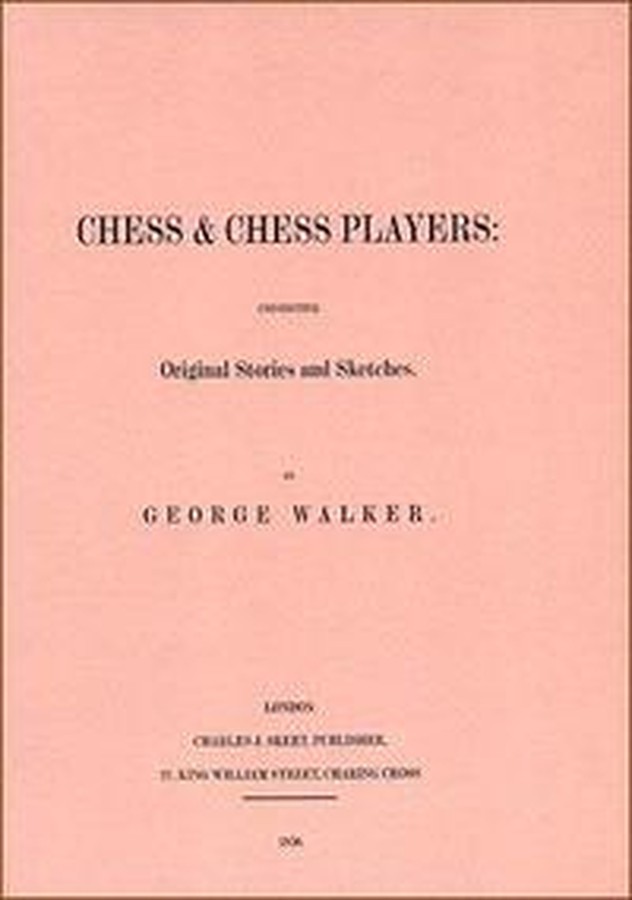| Utgivelsesdato | 2004 |
| Forfatter | |
| Pris | 325 NOK |
Chess & Chess Players Reprint 2004
Original Stories and SketchesGeorge Walker var en av de betydeligste skikkelsene, og forfatterne, i sjakklivet på 1800-tallet. Denne unike boka fra 1850 samler 11 av hans leseverdige "historier og skisser" som opprinnelig var publisert i ulike tidsskrifter på 1840-tallet.
En innbundet bok gledelig trykket opp igjen i våre dager. Kapitlene er disse:
- The Chess Automaton,
- Deschapelles The Chess King,
- A Night in York,
- Chess without the Chessboard,
- The Cafe de la Regence,
- Ruy Lopez the Chess Bishop
- A Legend of Spain, Mated and Checkmated - An Oriental Sketch,
- A Game of Chess with Napoleon,
- Vincenzio the Venetian,
- The Light and Lustre of Chess,
- Battles of La Bourdonnais and Mc Donnell.
Av en omtale av George Walker etter hans død, fra Huddersfield College Magazine 1879:
The story of George Walker's Chess career has been already told; by the Westminster Papers, with much detail, during his life, and by the weekly press, with more or less of that quality, since his death. As the pioneer of newspaper Chess columns, the founder of popular Chess clubs, as Author, Translator, and Editor, the highways of his singularly active life have been mapped, if not measured. So that there would seem to be no incident left unrecorded to provoke a fresh essay upon the subject. Yet it is doubtful if too much can be written of the life of one to whose wholesome influence upon his contemporaries we, who live after him, are chiefly indebted for the spread of Chess in England. The revolution he wrought will be better understood if we look back at the condition of the London Chess world at the time of his birth and during his boyhood.
George Walker was born in March, 1803, perhaps the dullest period in the history of London Chess. To the reign of Philidor had succeeded a regime of mediocrities and the game was barely kept alive upon memories of the past. Verdoni, accounted second-rate in Philidor's time, and Sarratt who was never more than Verdoni's peer, were the strongest players of the day. Sarratt, following Verdoui's example, had just bagun to dub himself "Professor of Chess" and was probably then engaged in compiling from unacknowledged sources the Treatise which he published some five or six years afterwards. It was an age of inkshed and not of play, when almost every one of note in the Chess world and many of no note at all contrived to link their names with buried genius by " editing" Philidor's Analysis. The establishment of the London Club in 1807, although it helped to increase the theoretical knowledge and practical skill of the members, exercised little if any influence towards the diffusion of either outside, indeed the organisation had an opposite effect to some extent because it concentrated all the experts within the walls of a clnb-house whose doors were sealed against the many. Nevertheless the prospect was brighter when Lewis and Cochrane superseded Verdoni and Sarratt—Lewis deserves special honour; for his works at this period of his career, the specimens of Oriental Chess, the edition of Stamma, and the translations of Greco and Carrera, all of which appeared in rapid succession between 1817 and 1823, brought the scientific theory of the game within the ken of the student. These works prepared the way for what followed, but they were not popular books as the term is now understood, they were costly as to price, and stilted in style, and they were not likely, nor perhaps intended, to kindle a spark of enthusiasm in the breast of a neophyte. It was in that age of starched neckcloths and formal manners (1823) that young George AValker imbued with the loftiest teachings of the game's traditions but unacquainted with any of its known practitioners made his first appearance in the Chess Arena.
Neither the scene of his debut nor the audience that witnessed it can be described as exalted; the first was the public room of a Coffee House then, and I believe now, called the "Percy" in Rathbone Place, and the audience comprised a set of young fellows, who, as Walker described them to me many years afterwards, were more remarkable for exuberance of spirits than for any quality of the mind. To this fortuitous concourse of Caissa's devotees he soon imparted some of his own enthusiasm, and as their numbers increased and their attendance became regular he persuaded them to form a club. A private room was engaged in the same house and the first association of Chess-players founded upon popular principles started into life under the name of the Percy Chess Club. It is unnecessary to follow minutely this phase of his life. It is sufficient to note that the seed sown in Kathbone Place bore good fruit, that men who had never heard of Chess were attracted to the "Percy" and remained there to learn, and that from the ashes of that Society sprang the famous Westminster Chess Club, Simpson's Divan, and subsequently the St. George's of our own day. Through all the varying fortunes of these Societies the most prominent figure was George Walker, cheering them in adversity and reorganising them when their ranks became broken, and one is astounded at the marvellous enthusiasm for Chess which survived the disappointments and obstructive selfishness he encountered in the work.
It was inevitable that his love of the game should be impressed upon its literature, and happily so for his writings have attracted more persons to the practice of Chess than any other author. His theoretical works have been described as obsolete, and the description is, of course, correct from the point of view of an analyst of the openings, but they never can become so in the regard of students of the game who are 'capable of being influenced by charm of style. No youth can read the preface to the "Art of Chess Play" without a desire to know more of the game which is there so eloquently described; and beyond the science of the analysis the most prominent feature of the book is an earnest desire to impart instruction the genial expression of which passes description. There need not be much fear of the Philidorian becoming obsolete cither, except indeed through wear and tear and the ravages of time upon such perishable materials as paper fand leather. The Philidorian was a monthly journal, which, like the Huddersfield College Magazine, was not exclusively devoted to Chess, and the bulk of it was written by Walker. Six numbers were published —December 1837 to May 1838—each of forty pages and a supplement embodying the first serious attempt to catalogue Chess books and their authors. For imagination and humour there is nothing superior to this magazine in the periodical literature of our time. "Vincenzio the Venetian" is a good example of the first and the sample chapter on Whist of the second.
Of the "Chess Studies" it is hardly necessary to say more than that as the work is so scarce it would probably pay some enterprising publisher to reprint it. It contains over one thousand games played by the greatest players of the period during which games were recorded prior to 1844, all selected with consummate judgment. There is another but less well-known book of Walker's which is brimful of interest to the book collector, the "Games played by Philidor and his Contemporaries." The games were afterwards incorporated in the "Studies" but the notes appended to them and the all too brief description of the players can only be found in the original edition. The last of his books which call for notice hero is the one so pleasantly associated with the early recollections of the present generation of Chess-players, the one destined to keep the author's memory green among ihe men of the next—" Chess and Chess Players." The originality, humour and keen observation of character displayed in this collection of tales are fair evidences that George Walker might have achieved a proud position in general literature if he had been disposed to direct his thoughts beyond the subject of Chess.
There is no space within the limits of this sketchy notice of a remarkable career to dwell upon even the important incidents which crowded its course of fifty years. The sketch would be altogether inadequate, however, without some reference be it ever so brief to Walker's connection with Bell's Life to which journal he contributed a weekly Chess article from 1835 to 1872. Here, as in his books, the freshness and originality of his style formed a marked contrast to the stereotyped mannerisms of some of his contemporaries, and his controversies when he engaged in them were pursued in the light of day. As a matter of fact I believe he never had a controversy with any one except Staunton. Both are now gone from among us and we meteors of a lower sky if we cannot emulate their light may well content ourselves with shedding some upon the greatness of their services.
| Innbundet? | Ja |
| Type | Bok |
| Førsteutgave år | 1850 |
| Språk | Engelsk |
| Antall sider | 384 |

